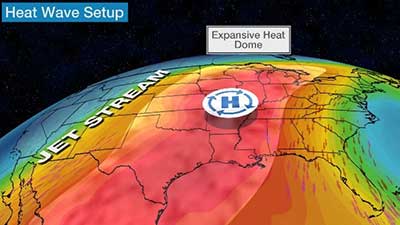Ahmedabad
(Head Office)Address : 506, 3rd EYE THREE (III), Opp. Induben Khakhrawala, Girish Cold Drink Cross Road, CG Road, Navrangpura, Ahmedabad, 380009.
Mobile : 8469231587 / 9586028957
Telephone : 079-40098991
E-mail: dics.upsc@gmail.com

Long Term Plan Needed to Combat Heat Waves
India has been in the grip of what seems like an eternity of heat waves. The temperatures over north-west and central India in April 2022 were the highest in 122 years. India is no stranger to heatwaves but what stands out about the heatwaves this year is the remarkably earlier timing, and the large spatial extent, extending from the northwestern to the southeastern parts of the country.
What are Heat Waves and causes behind the same?
• A heatwave is a period of abnormally high temperatures that occurs during the summer season in the North-Western and South Central parts of India. It is a condition of air temperature which becomes fatal to the human body when exposed.
• The nearest causes for the searing heat are an absence of rain-bearing Western Disturbances or tropical storms that bring rain from the Mediterranean over North-India.
• The combination of global warming and population growth in already-warm cities in India is the primary driver of increased heat exposure.
• The Urban Heat Island (UHI) also elevates temperatures within cities, which will be amplified during the heatwaves.
Role played by India in terms of Heat Wave Impact Mitigation Strategy?
• No National-level heatwave action plan was available before 2015 to fight against such calamities
• At the regional-level, Ahmedabad Municipal Corporation (AMC) prepared the first Heat Action Plan in 2013, followed by the devastating heatwave-related deaths in 2010.
• In 2016, the National Disaster Management Authority (NDMA) issued comprehensive guidelines to prepare national level key strategies for mitigating the impact of heatwaves.
Long Term Strategies needed by India:
• Death from heat waves can be prevented by installing improved early warning systems that communicate heatwave threats, recommend different preventative measures, and constrain disaster impacts. Disseminating public awareness through print, electronic and social media, providing heat-proof shelter facilities during summer, easing access to public drinking water, and huge afforestation in urban and rural areas would help mitigate heatwave fatalities.
• Recognising heat waves as a major disaster is long due. India still has a long way to go in building public awareness, particularly on how individuals and local communities can take care of themselves. Also, there needs to be clear guidelines regarding when to shut schools or about the optimal ranges of temperatures that a household AC should be kept at or how long one should stay outdoors if that’s unavoidable.
• The adverse impacts of heat waves indicate that effective disaster adaptation strategies and more robust disaster management policies are required in heatwave zones to lessen the impact of heatwaves.
• Passive cooling technology, a widely-used strategy to create naturally ventilated buildings, can be a vital alternative to address the urban heat island for residential and commercial buildings. The IPCC’s AR6 report cites ancient Indian building designs that have used this technology, which could be adapted to modern facilities in the context of global warming.
• A big reason that cities are so much hotter than rural areas is that they are covered by dark roofs, roads and parking lots that absorb and retain heat. One of the long term solutions can be replacing the dark surfaces with lighter and more reflective materials; it will result in a comparatively cooler environment.
Heatwave is India’s second most lethal disaster after the flood. Declaring heat waves as a natural disaster would help the state and district administration prepare a heatwave action plan at the regional level. This will help build resilience infrastructure, develop early warning infrastructure, and create public awareness. It is also crucial to prepare a database at the district level involving the age, gender, and occupation of people who have died due to heatwaves.

Address : 506, 3rd EYE THREE (III), Opp. Induben Khakhrawala, Girish Cold Drink Cross Road, CG Road, Navrangpura, Ahmedabad, 380009.
Mobile : 8469231587 / 9586028957
Telephone : 079-40098991
E-mail: dics.upsc@gmail.com
Address: A-306, The Landmark, Urjanagar-1, Opp. Spicy Street, Kudasan – Por Road, Kudasan, Gandhinagar – 382421
Mobile : 9723832444 / 9723932444
E-mail: dics.gnagar@gmail.com
Address: 2nd Floor, 9 Shivali Society, L&T Circle, opp. Ratri Bazar, Karelibaugh, Vadodara, 390018
Mobile : 9725692037 / 9725692054
E-mail: dics.vadodara@gmail.com
Address: 403, Raj Victoria, Opp. Pal Walkway, Near Galaxy Circle, Pal, Surat-394510
Mobile : 8401031583 / 8401031587
E-mail: dics.surat@gmail.com
Address: 303,305 K 158 Complex Above Magson, Sindhubhavan Road Ahmedabad-380059
Mobile : 9974751177 / 8469231587
E-mail: dicssbr@gmail.com
Address: 57/17, 2nd Floor, Old Rajinder Nagar Market, Bada Bazaar Marg, Delhi-60
Mobile : 9104830862 / 9104830865
E-mail: dics.newdelhi@gmail.com